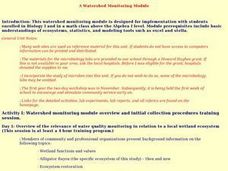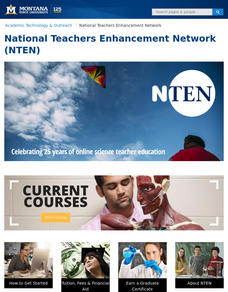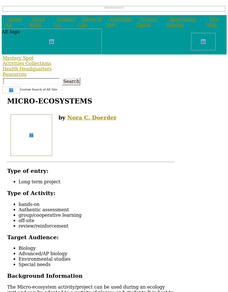Curated OER
Using A Winogradsky Column to Analyze Microbial Communities
Students use easily obtained materials to study ecological succession in a microbiological community. This investigation is appropriate for a variety of age groups. Elementary Students be fascinated by the changes occurring over time...
Curated OER
Dirt Life
Students select and collect soil samples from a variety of locations (schoolyard, home, etc.). They do this lab after an interest-generating discussion about "dirt" and microbes. Students make a dilution in sterile water, plate it on a...
Curated OER
A Watershed Monitoring Module
Students explore the relevance of water quality monitoring in relation to a local wetland ecosystem. They conduct standard water quality tests using wet tests and CBL calculators and probes. Student record and interpret the results.
Curated OER
Using A Winogradsky Column to Analyze Microbial Communities
Students use easily obtained materials to study ecological succession in a microbiological community. They collect water samples from outdoor sources in plastic bottles to observe and record changes.
Curated OER
Creatures in Torch Lake
Pupils investigate pond ecology. They gather water samples from various sources, add grass, and let it sit for a week. Afterward, using microscopes, they identify the microorganisms present in the sample.
Curated OER
Life in a Forest Stream
Students assess macro-invertebrates from a stream. In this science lesson plan, students observe, classify and identify organisms found in a stream. A lab station is constructed at the stream sight and students study the different...
Curated OER
Microbes and Our Food
Young scholars investigate foodborne illnesses and involved microbes. They identify major pathogens and then research and explain how they contaminate foods and how people are affected.
Curated OER
"The Yeast of Our Worries"
Students study yeasts or cellular respiration in this inquiry activity. They examine different types of bread to show which rise or do not. They measure the amount of carbon dioxide released by the yeasts when using different sweeteners.
Curated OER
Hazards of Defrosted Food
Peas spoilage hot, peas spoilage cold: examine the bacterial growth on newly defrosted peas versus peas that have been defrosted for 24 hours. Using the session one questions in the "Microbes and Food Spoilage" PDF, learners will make...
Nuffield Foundation
Nitrogen-Fixing Bacteria in Root Nodules of Leguminous Plants
Fixin' to add a great resource to your plans? Scholars perform an experiment to investigate nitrogen-fixing bacteria from plant roots. Along the way, they learn about the concepts of symbiosis and mutualism.
Exploratorium
Salty Pits
Yuck, does my deodorant kill that? To test whether deodorant is anti-bacterial, class members use petri dishes to grow control bacteria and bacteria from sweat, and then compare them to see if deodorant effects the...
Kenan Fellows
Unit 2: DNA Analysis
Ever wonder how they solve those mysterious murders in TV crime dramas? The second of four units in a Biotechnology series introduces scholars to the many methods of DNA analysis. Pupils create and run their own gel electrophoresis...
Curated OER
Yogurt Production
Students work together to complete an experiment making yogurt. They test different temperatures and different amount of ingredients. They record and analyze their data.
Curated OER
Smears
In this biology worksheet, students are shown how to prepare a smear and then answer some review questions that address the proper preparation of a sample.
Curated OER
Chapter 16, Food Biotechnology
Although the points given on these slides are valid, the visual accessibility is poor. Consequently, many viewers would be distracted or entirely unable to view the presentation. The content is a review of microorganisms and their...
Curated OER
Should Soil Be Sterile?
Students determine if the sterilization of topsoil is beneficial to seed germination and plant growth. They grow plants alongside control groups, make and record observations of plant growth and measure plant biomass.
Curated OER
How is Gold Found in the Ground?
Fourth graders participate in a series of activities designed to simulate mining for gold. They pan for "gold" and create a safe tunnel.
Curated OER
Micro-Ecosystems
Students create a sustainable, self-contained ecosystem in a ten-gallon aquarium.
Curated OER
Gold Mine
Students investigate gold. In this gold panning lesson, students demonstrate the process of mining through an experiment using two boxes of sand. Students design a safe way to mine gold.
Curated OER
What is Biocomplexity?
Students dicuss different aspects of biocomplexity. They demonstrate synthesis of complex concepts by creating before and after posters expressing how the concepts of biocomplexity have ben internalized. Students define the term...
Curated OER
Selecting Soil Organisms in Compost
Students conduct an experiment to demonstrate that many of the enzyme systems needed to break down society's wastes exist in nature among the decomposers in a compost pile. They culture compost bacteria on starch agar to examine the...
Curated OER
Selecting Soil Organisms in Compost
Pupils demonstrate that many of the enzyme systems needed to break down--and therefore clean up-society's wastes already exist in nature among the decomposers. They select the best starch-munching organisms by altering the environment in...
Curated OER
Microbial Spoilers: The Impact of Microorganisms on the Shelf-life of Milk
Students are inroduced to a commonly used microbial culturing technique. They explore the role of microorganisms in determining the shelf-life of food products.
Curated OER
Life's Big Questions: Where Did Life Come From?
Students explore the life forms that live in the hot springs of Yellowstone. They examine how microscopic creatures can survive in these extreme conditions. Students perform experiments to observe growth samples and demonstrate how a...























